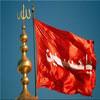
Today, in the fourteenth programme of our daily series on the Epic of Imam Husain (PuH), we look at the events which occurred on the 2nd Moharram in the year 61 AH, particularly on the arrival in the fateful land of Karbala of the grandson of Prophet Mohammad (blessings of God upon him and his progeny).
Imam Husain (PuH) entered the land called “Karbala” on the banks of the River Euphrates on Thursday, 2nd Moharram in the year 61 AH. As the Imam and his caravan arrived on this fateful tract of land, he turned to his companions and asked: “What is the name of this area?”
The companions replied: “Ghazariyya”. He said does it have any another name. The reply came: “Mariyya”. He again enquired of another name, and was told “Shatt al-Furat” or the Bank of Euphrates. Some locals said this land is also called 'Karbala', at which the Imam remarked that this is actually "Karbun wa Bala" meaning the Land of Grief and Affliction. Imam Husain (PuH) remembered what his grandfather the Prophet had told him about his place of martyrdom, and told his family and companions: “Let us disembark and offload our baggage here, because this is our destination. This is the land where our blood will be spilt, and this is where our graves will be. My grandfather, the Messenger of God has informed me of this!!
Then the Imam’s family and companions disembarked, and offloaded their baggage and whatever they were carrying. Horr also disembarked from his horse and his troops set up camp right opposite where the Imam had camped. Then the Imam gathered his children and family members and looked at them for a while. He prayed to the Lord by saying: “O Lord! We are the progeny of Your Prophet, Mohammad (blessings of God upon him and his progeny). The Omayyad expelled us from our ancestral homeland (Hijaz and the holy cities of Medina and Mecca). They have usurped our rights. O Lord! Restore our rights which the oppressors have taken away from us and make us victorious over them”.
Then the Imam addressed his companions by saying: “What has happened to us is what you see before you. The times have certainly changed. Corruption and evil have become all too obvious, and humanitarian values have been virtually wiped out. People are living a pitiful and shameful existence. In these circumstances it is worthy that a faithful believer should make the ultimate sacrifice, and hurry to meet his Creator. Living with these oppressors is just misery, pain and humiliation, and death means prosperity and freedom from this pitiful and shameful existence”.
In another part of his speech Imam Husain (PuH) said: “The vast majority of people are slaves and servants of this world, and their claim of being religious is an invalid claim, a hollow claim which rolls off their tongues. They are prepared to defend their religion so long as their wealth and possessions are not endangered; but when they are really tested (that is, if they have to choose between their wealth and religion), the genuinely religious people will be very few”.
As the Imam says, the best way of getting to know people is to test them out. There are people who look like devout and faithful Muslims, but their true nature becomes apparent when they are rigorously tested (i.e when they have to give up their wealth or even life in defense of Islam).
And now the grandson of the Holy Prophet was facing the evil Omayyads, the principal enemies of Islam, and was ready to offer his life, ready for martyrdom in combat, rather than submit to them or pledge allegiance to the Godless rule of Yazid. The Imam knew that members of his family and companions would be martyred as well, while the children and womenfolk of his household would be made prisoners, put in chains, and taken to Kufa and thence to Damascus. But this was a price he would unhesitatingly pay, in order to defend Islam, and the Holy Qur’an, to save Muslims and to act as beacon of guidance for people to do what is right.
source : irib













